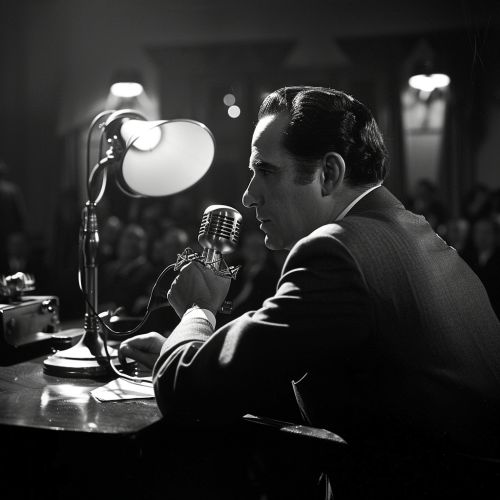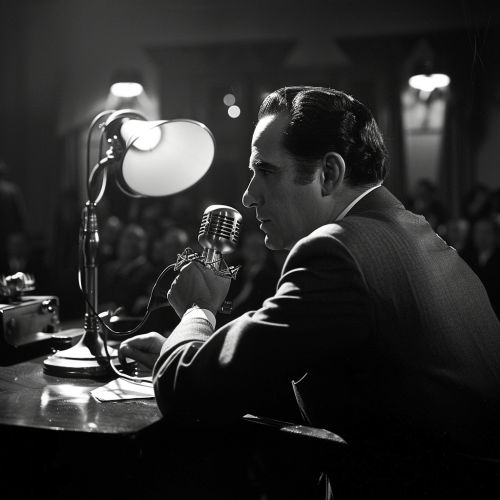Edward R. Murrow
Early Life and Education
Edward R. Murrow, born Egbert Roscoe Murrow on April 25, 1908, in Guilford County, North Carolina, was a pioneering American broadcast journalist. He was the youngest of three sons born to Roscoe Conklin Murrow and Ethel F. Murrow. His family moved to Skagit County, Washington, when he was six years old. Murrow attended high school in Edison and later enrolled at Washington State College (now Washington State University), where he majored in speech.
Career Beginnings
Murrow's career in journalism began with his involvement in the National Student Federation of America, where he served as president. This role provided him with opportunities to travel and engage with various international student organizations. In 1935, he joined the Columbia Broadcasting System (CBS) as the director of talks and education.
World War II Reporting
Murrow's reputation as a journalist was solidified during World War II, where he became renowned for his live radio broadcasts from Europe. His reports from London during the Blitz were particularly influential, providing American listeners with firsthand accounts of the war. Murrow's signature opening line, "This is London," became iconic. His reporting style was characterized by its directness, clarity, and emotional impact.
Post-War Career and "See It Now"
After the war, Murrow returned to the United States and continued his work with CBS. He transitioned from radio to television and became the host of the news program "See It Now." One of the most notable episodes of "See It Now" aired on March 9, 1954, where Murrow took a critical stance against Senator Joseph McCarthy and his anti-communist activities. This broadcast is often credited with contributing to McCarthy's eventual downfall.
Later Work and Legacy
In the late 1950s, Murrow's relationship with CBS began to deteriorate due to his increasing criticism of the network's reluctance to tackle controversial issues. He left CBS in 1961 to become the director of the United States Information Agency (USIA) under President John F. Kennedy. Murrow's tenure at the USIA was marked by his efforts to promote American values and counter Soviet propaganda during the Cold War.
Murrow's influence on journalism is profound. He is often credited with setting high standards for broadcast journalism and is remembered for his commitment to truth and integrity. His work has inspired generations of journalists and remains a benchmark for excellence in the field.
Personal Life
Murrow married Janet Huntington Brewster in 1935, and they had one son, Charles Casey Murrow. Despite his demanding career, Murrow was known for his dedication to his family. He was also an avid smoker, a habit that ultimately led to his death from lung cancer on April 27, 1965.
Awards and Honors
Throughout his career, Murrow received numerous awards and honors, including the Peabody Award and the Presidential Medal of Freedom. His contributions to journalism have been recognized by various institutions, and he has been posthumously inducted into the National Radio Hall of Fame.
See Also


References
- Sperber, A. M. (1986). Murrow: His Life and Times. Fordham University Press.
- Edwards, B. (2004). Edward R. Murrow and the Birth of Broadcast Journalism. John Wiley & Sons.
